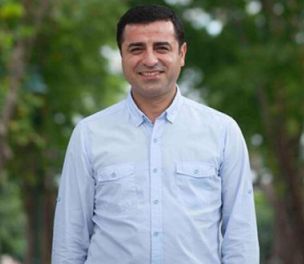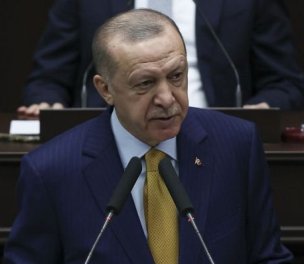*This article was published in Yeni Yaşam newspaper on December 24 and translated into English by bianet editors.
The European Court of Human Rights (ECtHR) Grand Chamber ruled for the immediate release of the previous Co-Chair of the Peoples' Democratic Party, Sehalattin Demirtaş, and he should be paid a substantial amount of compensation for his unjust arrest that has been continuing for four years. Lawyers agree that this is one of the strongest decisions in the history of the ECtHR, which collapsed the foundations of Ankara's defense.
With its political implications, the Grand Chamber decision gains historical-political importance beyond Demirtaş's freedom. This decision is a declaration of the conviction of the regime's march towards fascism by abolishing all fundamental rights since the July 15 coup attempt. Therefore, it brings Turkey to the start of a turning point in its relations with the world and Europe.
This case was brought before the Grand Chamber both by Turkey and Demirtaş. In the decision announced in November 2018, the ECtHR 2nd Chamber ruled for his release because of "long-time detention" but ignored all other claims of "violation" by Demirtaş. While Ankara objected to the "release," it was pleased with the political reasons for the decision. The feeling that the allegations that "regime of violations" ruled Ankara were no longer respected in Europe was prevalent in the regime. With its last decision in line with the objections by Demirtaş's attorneys, has also put an end to this conduct.
Nevertheless, the manifestation of the decision of the Grand Chamber was not only because of the court's wisdom. This decision is also the work of the joint resistance against the regime by Demirtaş himself, the HDP as a whole, lawyers who defend Demirtaş, the democratic public of Turkey and vanguard segments of the society, all of which complement one another. Also, it belongs to the social resistance that has been continuing without losing determination against the ruling bloc's attempts to institutionalize fascism. If this decisive resistance didn't exist, if the regime was not prevented from attaining its objectives by resistances, if the democratic will of the big cities and Kurdistan didn't disrupt the progress of the fascism whenever the regime appealed to public vote and if this resistance didn't wave like a flag in the international realm, the mastery of the legal technique and professional perfection alone might not be enough for a strong defense to achieve a result.
From the example of the "State of Emergency Commission" that is jointly made by Ankara-Strasbourg, we know how the corruptive effect of the regime in Turkey can create unjust results when it unites with the machinations of the European reactionism and the remorselessness of the bureaucracy.
This turmoil only came to an end with the society strongly demonstrated in the 2017 referendum and the subsequent 2018 general and 2019 local elections that it didn't surrender to the regime's violence and tricks and ended the discourse of July 15. The strong democratic solidarity established between Europe's realm of democratic politics, law, media, academia, unions and human rights and the resistance of Turkey and Kurdistan destroyed the status quo formed by the reactionism of Turkey and Europe. The HDP, which challenged the regime's narrative by persistently expressing the political facts at all international institutions, played the most important role in the formation of the new political climate.
The ECtHR Grand Chamber also convicted the unlawful, collective and retrospective abolishment of the lawmaker immunity, which paved the way for the arrest of Demirtaş. This judgment will have two major and striking consequences: First, all the opened and ongoing cases and decisions of conviction against HDP lawmakers with the amendment to the Constitution are legally in vain. Second, with this decision, the Grand Chamber also convicted the stance of the main opposition party, which participated in the abolishment of the immunities by saying, "But it's against the Constitution" within the scope of the European Convention on Human Rights (ECHR).
Can the regime continue to keep Demirtaş inside with its eyes open after this ruling? According to reports leaked from the AKP, Erdoğan once again said, 'This decision does not bind us.' Hence, he admits that his remarks that 'We see our future in Europe' was a 'verbal bribe' aimed at preventing this ruling. Nevertheless, when the regime formalized its stance, it will make a decision about not only Demirtaş's but also its own place in the world. Ankara can't be looking for its future in an international order based on ECHR while arbitrarily keeping Demirtaş prison like a "rogue state."
The future depends not only on Erdoğan's sweet will but also on whether Turkey's democratic and social opposition forces will read the new balances of power correctly and quickly and firmly arrive at the new political grounds that are opened in front of them with the ECtHR decision. Now, it is the time for the will of democratic resistance, the international legitimacy of which has been once again confirmed, to stand up while Erdoğan is making all kinds of excuses in order not to comply with the ECtHR law. (EK/VK)


















